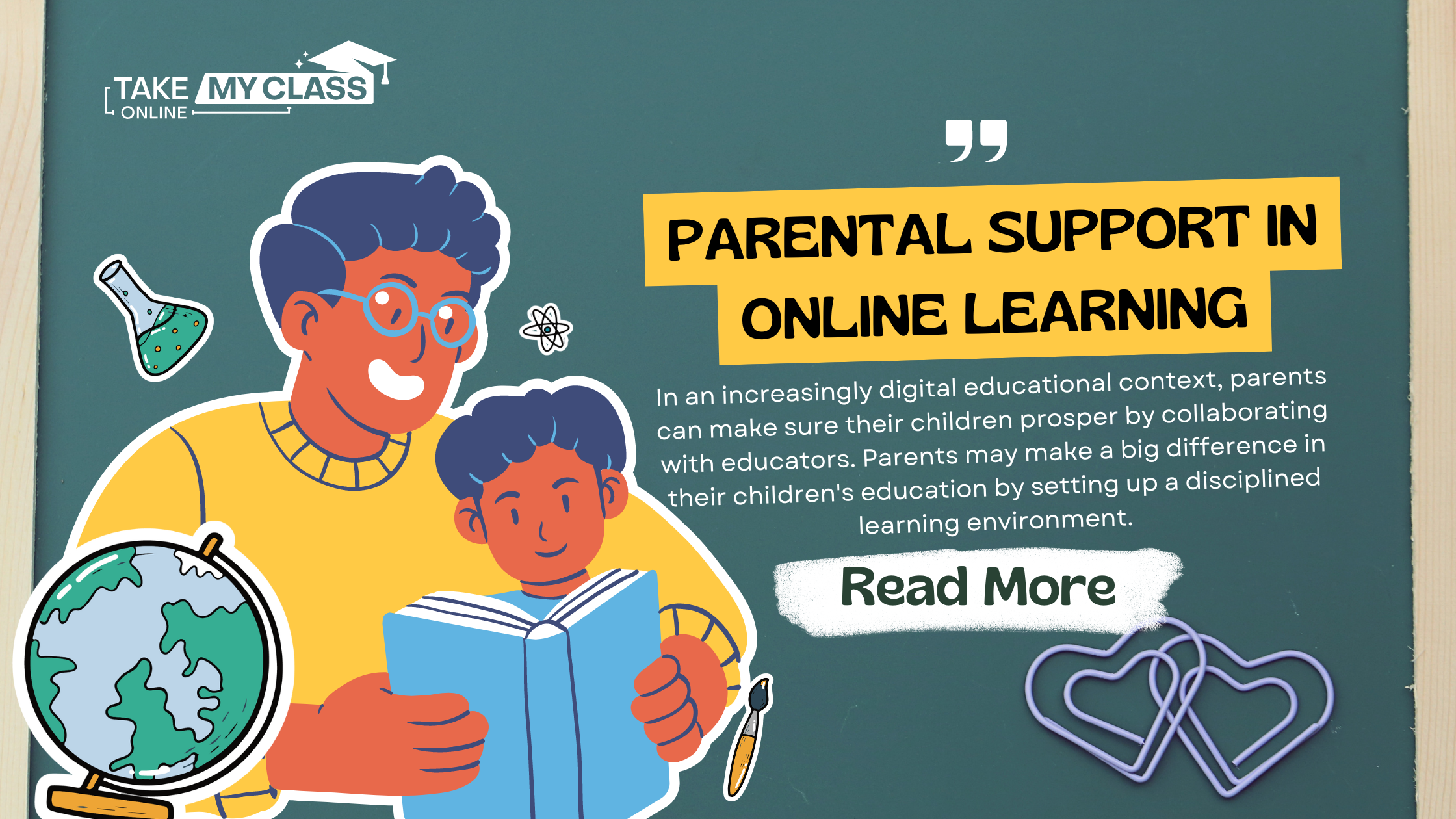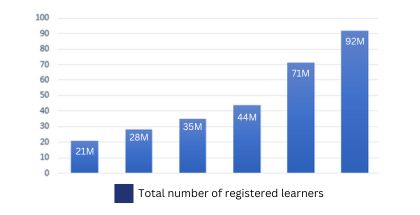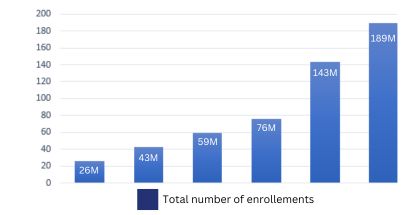The Role of Parental Support in Online Learning

The introduction of technology has changed the face of education, especially with online learning and the importance of parental support in online learning can never be avoided. The worldwide pandemic has sped up this change, which has presented parents, teachers, and children with new opportunities as well as difficulties.
The degree of parental support in online learning is one of the most important aspects affecting a student’s performance in online learning settings. Parents are essential in helping their kids succeed in school by ensuring they stay motivated, engaged, and capable of handling the rigors of online learning.
This blog provides helpful tips to improve student results while examining different facets of parental support in online learning.
Transition To Online Learning
The worldwide epidemic has expedited the movement in the educational environment toward online learning, which is a major development. In today’s world taking guidance for exams or getting professional online class help is just a click away.
Students, instructors, and educational institutions have faced both possibilities and problems as a result of this change. Taking the example of COVID-19, there was difficulty in creating a study space at home, but now we are facing technology, right?
More Learners are Accessing Online Learing
The Demand For Online Learing by Takemyclassonline.us.com


Positively, students may now learn from home and at their own speed because of the increasing accessibility and flexibility of online learning. This date, if someone demands that take my online class for me, he can get tons of help at affordable rates too. Additionally, it has made it possible to incorporate interactive simulations, collaborative platforms, and multimedia materials, all of which improve the learning process.
With improvement now there are even online education resources for parents too, so that parents can always stay ahead of their children. This way a larger audience may be reached through online education, dismantling barriers based on geography, and democratizing education.
Importance of Parental Involvement in their Child’s Life
A child’s emotional, cognitive, social, and behavioral development is all based on the foundation that parental support provides. The sense of stability, security, and comfort that parents offer is crucial for a child’s mental health.
Parents make children feel loved, respected, and accepted by showing them compassion, empathy, and understanding. This helps youngsters feel more confident and self-assured. Parental participation in school, such as helping with homework and fostering curiosity, may have a big impact on their children.
Parenteral Support in Online Learning
We all know how important are parents are and what sacrifices they have made, but have you ever thought they are also struggling with us? In this world of technology, seeking education is not a piece of cake. Understanding technology and its changing innovations almost every day is not just challenging for us but for our parents too. In the same way, parenteral support in online learning can never be taken for granted.
Creating a study space at home to provide financial, moral, and spiritual help, we are nothing without them. In online learning, parental engagement is essential for a number of reasons. First of all, for young pupils to successfully traverse the online learning environment, they frequently need supervision and direction.
Pupils who experience parental support in online learning are more likely to persevere despite difficulties and keep a good outlook on their academics.
How Parents Are Actually Helping Their Children?
The key to know here is the execution of parenteral support in online learning. Parents use the following ways to help their children learn online:
Establishing a Helpful Learning Environment
Firstly, a parent support online learning by creating a friendly and accommodating environment at home. This entails creating a room just for studying, making sure the tools and equipment you need are close at hand, and reducing outside distractions.
Parents who actively contribute to this atmosphere are sending a strong message to their kids about the value of education.
Tracking Responsibility
Students who learn online frequently need to exercise greater self-control and take responsibility for their own development. Parents may monitor their children’s assignments, deadlines, and grades frequently to help them remain on track. This monitoring helps students acquire and refine critical time management and organizational skills in addition to ensuring that they finish their tasks.
Emotional Support
Another major aspect of parent support in online learning is emotional support for their children. A child’s capacity to develop emotionally normally depends on their parent’s ability to provide them with a feeling of comfort.
Children benefit from parental love and understanding because it makes them feel liked which increases their confidence and self-worth. Parental support and direction can aid children in overcoming obstacles and building resilience.
Academic Support
There is more to parental participation than just setting up a study area and picking up assignments. In addition, parents may actively participate in their child’s education by assisting them in grasping complex ideas.
This can be especially useful for courses where students might find it difficult to get advice from a teacher right away.
Support for Finance and Logistics
Parents are essential in providing the financial and logistical resources required for their children’s online learning experience. This involves making certain that you have access to dependable internet connectivity and any necessary software or educational resources.
Students can find it difficult to join and engage completely in their online lessons without these essential tools. Parents may assist in eliminating any barriers and establishing an atmosphere that supports their children’s success in the virtual classroom.
Inspiration and Reinforcement
Even though there are numerous advantages to online learning, there are drawbacks as well. Students may not get the same motivation and social connection as they would in a regular classroom. Parents can intervene in these situations by providing emotional encouragement.
A parent’s ability to support their kid through difficulties and to celebrate their little accomplishments can have a big impact on how well their online learning experience goes.
Resources for Parents to Help Their Children for Online Classes & Learning
When switching to online learning, there are many online resources for parents, families and students from where they can get help:
National PTA: National Parent Teacher Association
 Organizations like the American Federation of Teachers and the National Parent-Teacher Association are some of the best online resources for parents families and students. They offer parents and families in-depth manuals and webinars on how to support their child’s social-emotional development.
Organizations like the American Federation of Teachers and the National Parent-Teacher Association are some of the best online resources for parents families and students. They offer parents and families in-depth manuals and webinars on how to support their child’s social-emotional development.
These materials address issues including allocating a specific area for studying, controlling screen usage, and using online learning environments.
Online Courses
These include practice exercises, interactive lessons, and online courses on a variety of topics, from career-focused skills to fundamental academic disciplines. Additionally, a lot of districts and schools have created their own online learning centers where students may access course materials.
Online Communities
In order to connect, exchange best practices, and provide mutual support throughout this transition, parents, teachers, and kids can join a variety of online forums.
These platforms enable the sharing of concepts, advice, and materials to assist all parties in navigating the challenges associated with remote learning.
Challenges and Things to Think About
Although the advantages of having parents assist their children with their online education are widely established, parents should be aware of some difficulties and factors.
For example, some parents might not be as tech-savvy or have access to the tools they need, which might make it difficult for them to assist their kids’ online learning.
Finding a balance between encouraging independence and offering help is another factor to take into account. As vital as parental engagement is, it’s as critical to provide children the freedom and space to grow as self-directed learners.
As children grow through their childhood, parents should gradually shift them toward greater independence.
Conclusion
With the increasing popularity of online learning, it is critical that parents recognize the value of their engagement and implement tactics that will best assist their children in their academic endeavors. In an increasingly digital educational context, parents can make sure their children prosper by collaborating with educators. Parents may make a big difference in their children’s education by setting up a disciplined learning environment.
Frequent Ask Questions
How can parents set up a setting that is favorable for learning at home?
To help their child learn online, parents may create a dedicated study area, and make sure their child has access to the tools they need.
What part do parents play in keeping an eye on their child's development and responsibility?
To assist their child in staying on track and gaining valuable time management skills, parents may keep a close eye on assignments, deadlines, and grades.
How can parents help their children retain the principles they are learning?
Parents may actively participate in their child’s education by having discussions about the subjects being studied and offering assistance in understanding challenging material.